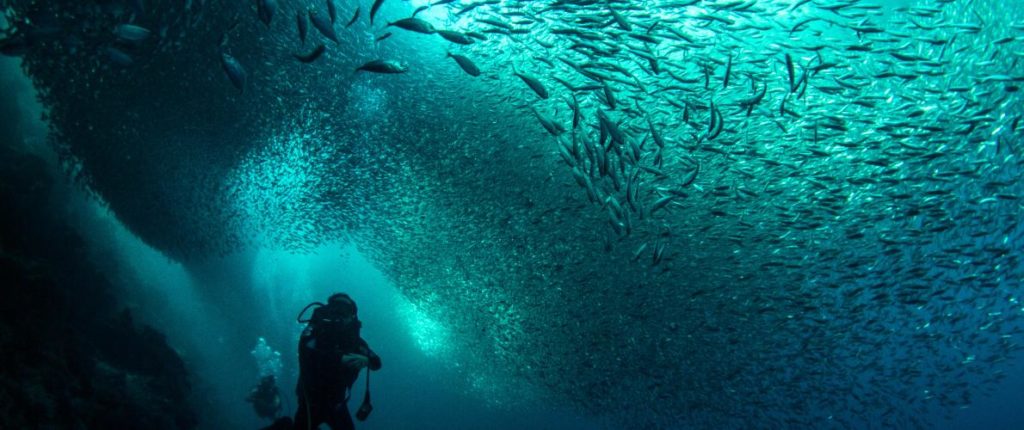
20 Aug 2021 Oceana senior adviser Alexandra Cousteau rallies Filipino youth groups against plastic pollution
Never too young to save the oceans
Even at a very young age, Alexandra Cousteau, granddaughter of renowned undersea explorer and scuba diving pioneer Jacques Cousteau, already knew the potential of the youth in bringing about change as she rallied support from them for ocean conservation.
In the Generational Conversations organized by Oceana and Kids for Kids recently, Cousteau shared how she developed the love for the oceans and, at a very young age, when she was eight, she was already busy gathering signatures to protect the ocean.
“I went on an expedition with my parents for the first time when I was four months old and traveled with them. I could swim before I could walk. My grandfather taught me to scuba dive when I was seven, and that was a total revelation for me. People often ask me, ‘What was the moment that made you want to work to save the oceans?’ And there really wasn’t one. It just has always been part of me,” Cousteau shared to the youth leaders who participated in the round-table discussion.
Cousteau said she could not overstress how important youth voices were but she also believed that there was a role for everyone and the youth couldn’t do it all. “We need seasoned experts, we need scientists, everybody really has an important role to play. But the youth have a role that is new. Because when I was a teenager, nobody was listening to teenagers. Nobody. (But) there is now an official role for young people to play in changing the world,” she explained.
Sisters Bella and Tasha Tanjutco, founders of Kids for Kids, explained that this is the first of the series of the Generational Conversations meant to empower the youth, and encourage them to “sit down with people from different walks of life and see different perspectives on how we can attack this climate crisis together.”

Andi Mañosa, 13, shared during the online talk that the challenge was to change the mindset of the youth and convince them that they too could help in efforts to restore the abundance of life in the ocean.
“Most people my age have the mindset that because we’re so young we can’t do anything to help. What I really hope is that people my age finally realize that age shouldn’t be the reason that you’re not helping,” she said.
According to Oceana vice president Gloria Estenzo Ramos, Oceana makes sure that the youth are part of their engagements.
‘People often ask me, “What was the moment that made you want to work to save the oceans?” And there really wasn’t one. It just has always been part of me.’
“Like what Alexandra said, be the voice and don’t hesitate to make a stand. Your participation is important in our work to save the ocean,” Ramos told the participants.
Youth leader representatives shared their experiences and insights with Cousteau on the plastic pollution and the climate crisis.
When asked by 23-year-old Youth Advocates for Climate Action Philippines (YACAP) representative Coleen Salamat about what could still be done if the plastic waste had reached the ocean, Cousteau sadly replied that so far there seemed to be no cure to the devastation caused by plastics to marine biodiversity.
“I think a lot of people are thinking about how to get the plastic that are already in the oceans out of the oceans. And I haven’t come across any good answers. Once it’s there it starts to degrade to microplastic, and sinks to the bottom. Recently I was talking with a team that had been exploring the bottom of the Marianas Trench, which is the deepest part of the ocean, and they were finding plastic there. So getting it out once it’s there is really hard,” explained Cousteau.
The Oceana senior advisor shared what she learned when she joined a documentary of the National Geographic about plastic in the Mediterranean, a couple of years ago: “We were out on a sailboat sampling seawater to measure the amount of plastics in the water. And they told me they had been sampling every day for the past seven years and there hadn’t been a single net that came back without microplastics. There’s no clear solution right now, and that’s what makes stopping the plastic from entering the ocean so important.”
Oceana recently sent notices to sue to concerned government officials of agencies that had neglected the implementation of Republic Act 9003 or the Ecological Solid Waste Management Act of 2000. The 20-year-old law mandates the National Solid Waste Management Commission (NSWMC) and other concerned agencies to issue a list of non-environmentally acceptable products and packaging (NEAPP). Many of the petitioners who plan to file the lawsuit are from the youth sector.
Oceana is an international advocacy organization dedicated to protecting the world’s oceans. Since 2014, Oceana has been working closely with national and local government agencies, civil society, fisherfolk, and other stakeholders to restore abundance of Philippine fisheries and marine resources.

